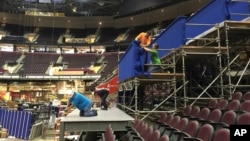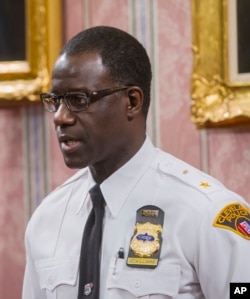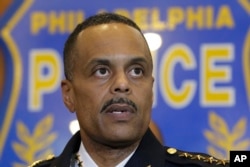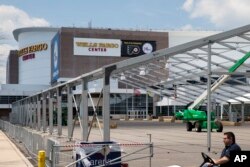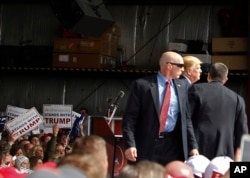Federal, state and city officials are tightening security plans for the upcoming Republican and Democratic conventions amid heightened concern after the deadly ambush of police officers on July 7 in Dallas, Texas.
“Anytime there’s a national spotlight on a political event in the United States, there’s a risk that groups that aspire ... to engage in acts of domestic terrorism will be attracted,” FBI Director James Comey said during congressional testimony Thursday.
Department of Homeland Security Director Jeh Johnson told lawmakers, “I am concerned about the possibility of violence. I am concerned about the prospect of demonstrations getting out of hand.”
Johnson said he would travel to Cleveland on Friday and Philadelphia next Friday to inspect the security at both convention sites.
About 50,000 people are expected to converge on Cleveland, Ohio, for the Republican National Convention July 18-21, where Donald Trump is likely to be named the party’s presidential nominee.
A week later, a similar number will gather in Philadelphia, Pennsylvania, where Democrats will crown Hillary Clinton as their party’s presidential candidate.
Open carry
Security concerns in Cleveland are compounded by Ohio’s status as an open-carry state, meaning anyone with a legally permitted gun may carry it openly.
“We’re going to make sure we stay vigilant,” said Cleveland Police Chief Calvin Williams. “But we also want to make sure that we ask the community to remain vigilant.”
Williams said he would prefer that people not openly carry firearms during the Republican convention, but added, “I’m bound to uphold the law in the state,” and he insisted the city was prepared.
The U.S. Secret Service has banned guns inside the main convention site, Quicken Loans Arena, as well in the security perimeter around the site. However, protesters with firearms will be allowed to carry them in the 4.4-square-kilometer event zone surrounding the arena as long as the guns are holstered.
Williams declined to specify what changes were made after the Dallas shootings, but officials have increased surveillance and intelligence operations and have installed metal security barriers. They have also moved up by one week the activation of a tip line for reporting suspicious activity.
Possibility for clashes
Even before the Dallas shootings, officials in Cleveland were concerned about the potential for violent clashes between Trump supporters and opponents, who will share park space in the event zone only blocks from the convention site.
Physical altercations between protesters and Trump supporters have occurred during the campaign season, and law enforcers have long planned for the possibility of more in Cleveland.
On Monday, Trump stopped just short of predicting more violence.
“I mean, you were having big, big trouble in many cities,” he said. “And I think that might be just the beginning for this summer.”
As Trump and Clinton have repeatedly attacked each other, resentment has deepened among their followers, which could have consequences at the two conventions.
Cleveland security
The Cleveland mayor’s office said the “size and significance of the convention creates unique challenges” for the city, thus the implementation of special restrictions.
Cleveland officials plan to enforce strict rules to control demonstrators. Protest areas will be hundreds of meters from Quicken Loans Arena. Although guns will be allowed, common items like glass bottles, large backpacks, mace and canned goods will be banned from the event zone.
A federal judge last month struck down city rules for protesters within the event zone, declaring the security plan “severely limited” opportunities for free expression. The rules would have limited where demonstrators could speak within the zone. The previous security plan was replaced with a new one that expanded the parade route for protesters. It also added buffers between protest groups.
Philadelphia security
In Philadelphia, Police Commissioner Richard Ross said Monday that the Dallas shootings had “required that we do things different tactically,” but he declined to elaborate on strategies.
Philadelphia officials have taken a different approach than their counterparts in Cleveland. The city will allow supporters of former Clinton rival Bernie Sanders to rally throughout the day in a park across the street from the convention site at Wells Fargo Center.
The arena will be protected by a newly constructed perimeter more than 1.5 meters high.
Thousands of Sanders supporters are expected to congregate in Philadelphia for the convention July 25-28. Through demonstrations, they hope to persuade the party establishment to reform the presidential nominating process by rejecting the growing influence of corporations in the electoral process.
Philadelphia mayoral spokeswoman Lauren Hitt told VOA that officials had met with protest groups and expected demonstrations outside the arena to be peaceful.
“We have decriminalized many offenses, like refusal to disperse and disorderly conduct, to avoid mass arrests," Hitt said. "They will be issued fines instead. [We] ... feel confident that we’re prepared for demonstrations and any public safety threats.”
In a move that could add to the expected chaos in Philadelphia, airport workers have voted to go on strike during the convention. The Service Employees International Union said Wednesday that up to 1,000 security workers, baggage handlers and cabin cleaners working for three subcontractors would walk out in an attempt to organize the staff into a union. SEIU said it hoped to garner support from the Democratic National Convention.
Federal preparations
“If individuals or groups decide to act unlawfully, plans have been put in place to efficiently address them," Secret Service spokeswoman Nicole Mainor told VOA. "We understand the nature of [these events] and have anticipated the number of individuals we may encounter.”
For 18 months, the Secret Service has been collaborating with numerous local and federal law enforcement agencies such as the Department of Homeland Security and the FBI to prepare for the conventions.
Preparations are based on an “all-hazards approach,” Dan Bulla, president of the Treadstone Group, a private security firm in Charlotte, North Carolina, said in an interview with VOA.
In addition to physical acts of civil disobedience and “anarchist-style events” such as blocking streets and disabling police vehicles, law enforcers are also preparing for “extraordinary crimes” such as terror and cyber attacks, said Bulla, who is consulting with several private-sector entities involved in security planning for the conventions.
In addition to disruptive events and threats, Bulla said, law enforcers spend considerable time planning for bomb threats, minor medical emergencies and minor criminal activity such as pickpocketing, fraud, vandalism, fighting and disorderly conduct.
Law enforcement agencies have developed a “three-tiered response” to any unrest that may occur outside the convention sites, Bulla said. Uniformed and plainclothes officers first arrive on the scene, followed by horse-mounted and bicycle officers. Mobile field forces, commonly known as riot police, will be on standby in both cities with armored vehicles and other riot control equipment.
Because both conventions are large-scale gatherings that could be targets of terrorism, Homeland Security has designated them "national special security events." As a result, Cleveland and Philadelphia have each received $50 million in federal grants to pay for equipment and other items to help keep the convention sites and the areas around them safe.




